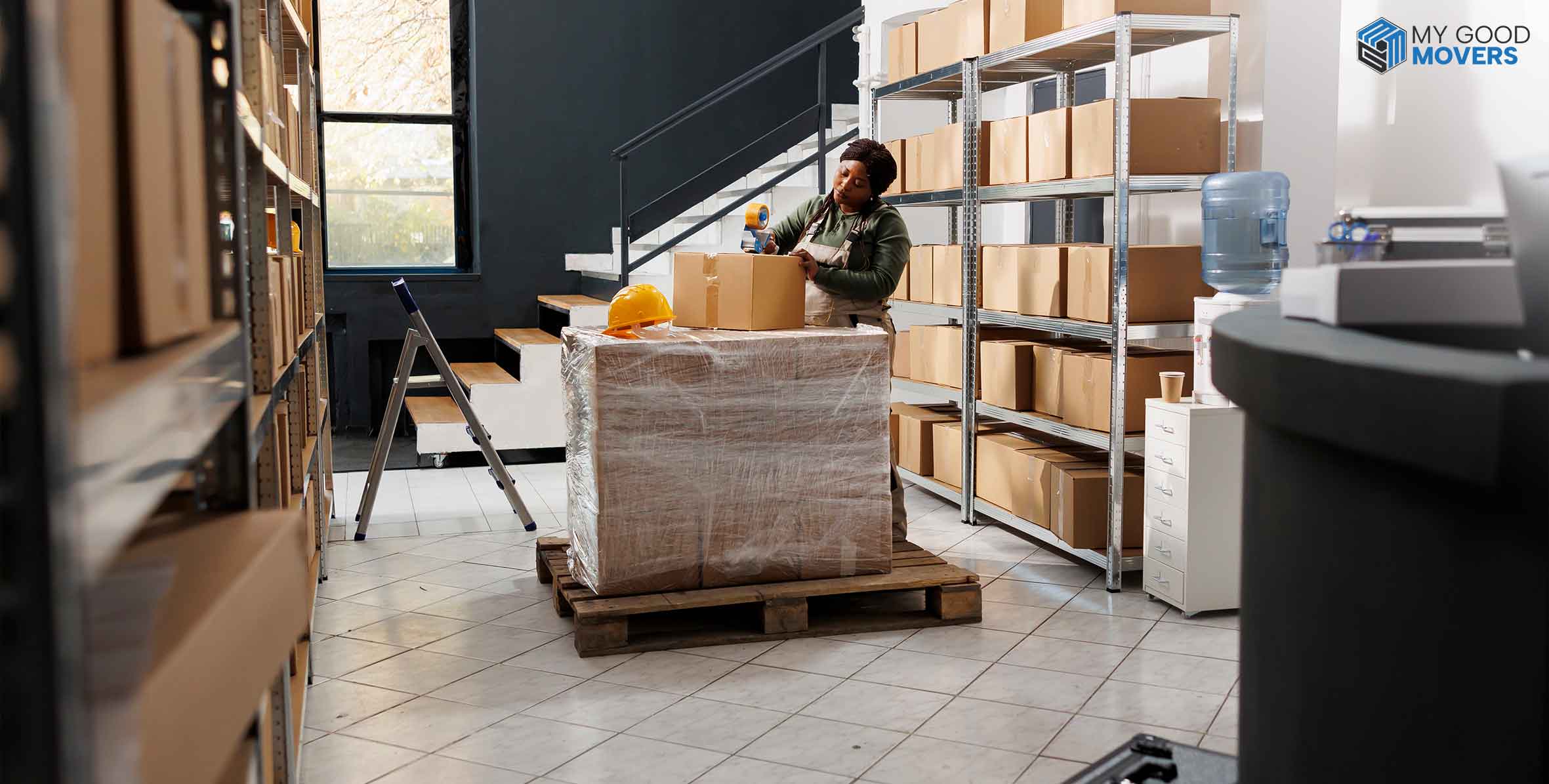Space is the breath of art.
It doesn’t matter if you are managing a small enterprise or a growing company; space is a powerful resource.
In 2024, businesses in the US are finding the need for storage solutions more than ever.
Did you know that over 10% of small businesses list lack of space as one of their top three challenges?
The commercial storage market itself is expected to reach $58 billion by 2026.
These numbers show that business storage needs are growing fast, and the market is rapidly evolving to meet those demands.
Think about it: space allows for organization, safety, and growth potential.
From controlling seasonal inventory to securely storing valuable equipment, commercial storage has become indispensable for businesses across industries.
But how do you choose the right one?
Between the different types, like climate-controlled units and full-service warehouses, it’s essential to understand what’s available and what each type offers.
In this blog, we will discuss everything you need to know to make a well-informed choice that aligns with your business needs and budget.
Commercial Storage Options
In 2024, commercial storage will become diverse and fulfill diverse business needs.
On-Site Storage
It is Ideal for businesses with available outdoor space.
This usually means either on-site storage or a lock-up container that is available 24/7.
This is an easy and cheap option, but it may not have climate control or high-security features.
Self-Service Warehouse Storage
Self-service warehouses allow easy access at a lower cost.
It is perfect for businesses needing accessible storage but also able to manage their own logistics.
However, these are often less secure and not climate-controlled, which makes them best suited for items that do not require special environmental conditions.
Full-Service Warehouse Storage
You can have free or cheaper access to items at self-service warehouses.
This is well-suited to businesses looking for a simple storage option to handle their logistics.
These, however, typically do not have the same security, nor are they climate-controlled, which would make them best suited to items that don’t need any special environmental conditions.
Specialty Storage
In 2024, high-demand specialty options include climate-controlled containers, RFID-enabled units for inventory tracking, and even collaborative storage spaces.
It allows multiple businesses to share a single storage space, which reduces costs and increases efficiency.
Key Factors to Consider
Space Requirements and Layout Needs
Knowing how much you have and whether high-density or vertical storage would be best for your particular situation.
For example, high-capacity vertical containers can effectively utilize ceiling height, which maximizes storage efficiency without occupying additional floor area.
Climate Control
When storing electronics, perishable goods or anything that could be damaged by extreme temperatures, you must place the item in a climate-controlled unit.
Recent trends suggest that industries such as food processing, pharmaceuticals and e-commerce channels can never side-step climate-controlled environments.
Security Features
Security is important for commercial storage units containing valuable assets.
Look for 24/7 surveillance, controlled access with keypad or biometric entry and lighting to provide some level of safety.
It can also help in keeping inventory tracked through RFID-enabled storage.
It helps prevent loss and maintain records.
Accessibility
Check the location and operational hours of the storage facility.
Ideally, choose a facility near your primary business location to minimize travel time and transportation costs.
Many facilities now offer 24/7 access, which is invaluable for businesses needing frequent access to inventory or equipment.
Flexibility and Scalability
Business needs can change, so a storage solution that allows for easy scaling up or down is beneficial.
Flexible contracts help avoid long-term commitments and allow for adjustments as your storage needs evolve.
Benefits of Commercial Storage for Your Business
Investing in commercial storage brings several advantages that can increase your business's operational efficiency and growth potential:
Efficient Use of Office Space
Off-site storage means you can reclaim valuable office space for core business activities.
Inventory Management
For e-commerce or retail businesses, many storage providers offer additional services like packaging and shipping.
It enables smoother order fulfillment and reduces logistical headaches.
Cost Savings
Commercial storage units are much cheaper to rent on a monthly basis than expanding office or warehouse space for smaller and mid-size businesses.
A few studies even state that commercial storage per square foot can be 30–50% less exorbitant than customary renting of workplace space.
Security and Reliability
The state-of-the-art facility, security including surveillance, restricted access and insurance coverage, can give one peace of mind, especially if your inventory is expensive.
How Much Does a Commercial Storage Cost?
Let’s discuss the details of "How Much Does Commercial Storage Cost?" This is an important question, as storage is more than just the monthly rental fee.
The Main Cost Factors of Commercial Storage Cost
Location of the Storage Facility
Just like any real estate, storage costs are affected by location.
Storage units in urban areas (e.g., New York City, Los Angeles) typically cost more due to higher demand and property values.
Moving storage to a less central or suburban location can reduce monthly rates by 20-30%.
For example, a basic storage unit in NYC might start at $250 per month, while the same unit in a rural area may be closer to $100.
Type and Size of the Storage Unit
Different units come with different prices, especially if you need specialty options like climate control, security features, or warehouse services.
Climate Control
Climate-controlled storage is essential for storing temperature-sensitive items (such as electronics, documents, or pharmaceuticals).
This service typically adds an extra 20-50% to your base cost.
Security Features
Security options in commercial storage can range from basic gated access to high-end 24/7 surveillance, alarms, and biometric entry.
Basic units generally include standard security (e.g., gated access), while advanced security features can add $50–$200 or more to your monthly fee.
Access and Accessibility Requirements
If you need regular access to your items, 24-hour or drive-up access is more convenient but might add to your cost.
Facilities with easy access options, such as drive-up units, typically charge 5–10% more than standard units.
Similarly, expect higher rates if you require a facility close to your business for easy drop-ins.
Additional Services (Full-Service, Insurance, Packing)
Full-service storage facilities offer additional services, such as inventory tracking, transportation, packaging, and shipping.
These premium services can add substantial costs but may be invaluable for businesses managing large or delicate inventories.
Breakdown of Commercial Storage Costs
| Cost Factor | Description | Estimated Monthly Cost (USD) |
|---|---|---|
| Basic Monthly Rental Fee | Cost for a simple storage unit varies by size and location | $100 - $500 |
| Climate Control | Adds temperature and humidity regulation | $50 - $200 |
| Security Features | Includes basic gated access to high-end options like biometric access | $20 - $150 |
| 24/7 Access or Drive-Up Access | Easy access options for businesses needing regular entry | $10 - $50 |
| Full-Service Options | Packing, tracking, and inventory management services | $100 - $300 |
| Insurance Coverage | Liability and asset protection, required by some facilities | $10 - $50 |
| Utility Fees | Utility fees like lighting, heating (for climate-controlled units) | $5 - $30 |
Total Cost Examples
Here’s an example of what monthly costs could look like for different types of businesses with unique storage needs:
| Business Type | Storage Type | Monthly Base Cost | Added Features | Estimated Total Monthly Cost |
|---|---|---|---|---|
| Retail | Basic Self-Service Unit | $200 | 24/7 access ($20) | $220 |
| E-commerce | Climate-Controlled Unit | $300 | Climate control ($50), security ($50) | $400 |
| Pharmaceuticals | Full-Service, Climate-Controlled | $500 | Climate control ($100), insurance ($30), inventory management ($100) | $730 |
| Construction Equipment | On-Site Storage Container | $150 | Basic security ($20) | $170 |
Tips to Manage and Reduce Commercial Storage Costs
Choose Location Wisely: Go for suburban or rural locations if daily access isn’t essential.
Consider Flexible Contracts: Many facilities offer month-to-month leases. This flexibility is ideal for businesses with changing inventory needs.
Negotiate Security Needs: Some facilities may allow you to customize security options so you only pay for what you need.
Ask About Insurance Options: Verify if your facility offers bundled insurance rates; otherwise, your business insurance policy may already cover off-site assets.






 (239)799-6077
(239)799-6077